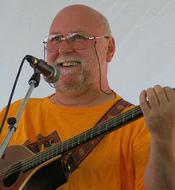'Cause any Mick'll do, any black, any Jew
Any poor wee soul (bugger) who's not like you
They're down from the trees and they're up from the bogs
They come round here and they steal your job
They're all the bloody same - just no' the same as you
And when a scapegoat's what you need - any Mick'll do
Gerry Conlon stood before the jury (*)
Before the judge in his gown and his wig
And the whole damn country was sure he was guilty
Even though the evidence was rigged
And when it all came out, it was the old familiar shout
He'll be guilty of something, sure as hell
What's a Paddy more or less, and anyway, he confessed
Stick him down in his cell, and his father as well
They told Annie Maguire she was a bomber (*)
She heard every expert witness testify
That they'd found traces of gelignite upon her hands
And British justice would not be denied
And when they found they were wrong, it was the same old song
She's a danger to us all if she's free
With every day that goes by, we're more committed to the lie
So just leave her be and throw away the key
I hate every Jew who kicks a Palestinian
And every Nazi who ever kicked a Jew
I hate every stupid bigoted opinion
And if you don't hate them too, then I hate you
But what I hate most of all is the sheer damned gall
Of a system that never thinks twice
About furthering a grudge with a jury and a judge
And when they're loading the dice, tell me who pays the price
Any poor wee soul (bugger) who's not like you
They're down from the trees and they're up from the bogs
They come round here and they steal your job
They're all the bloody same - just no' the same as you
And when a scapegoat's what you need - any Mick'll do
Gerry Conlon stood before the jury (*)
Before the judge in his gown and his wig
And the whole damn country was sure he was guilty
Even though the evidence was rigged
And when it all came out, it was the old familiar shout
He'll be guilty of something, sure as hell
What's a Paddy more or less, and anyway, he confessed
Stick him down in his cell, and his father as well
They told Annie Maguire she was a bomber (*)
She heard every expert witness testify
That they'd found traces of gelignite upon her hands
And British justice would not be denied
And when they found they were wrong, it was the same old song
She's a danger to us all if she's free
With every day that goes by, we're more committed to the lie
So just leave her be and throw away the key
I hate every Jew who kicks a Palestinian
And every Nazi who ever kicked a Jew
I hate every stupid bigoted opinion
And if you don't hate them too, then I hate you
But what I hate most of all is the sheer damned gall
Of a system that never thinks twice
About furthering a grudge with a jury and a judge
And when they're loading the dice, tell me who pays the price
(*) Come “The Guildford Four” (tra cui Gerard "Gerry" Conlon, 21 anni) e “The Maguire Seven” (tra cui Anne Maguire, 40 anni) sono conosciuti i casi di due gruppi di cittadini nord-irlandesi che nel 1975 furono condannati dalla giustizia dell’occupante inglese a pesanti pene detentive, i primi per appartenenza all’IRA e per aver realizzato un attentato in un pub di Guildford l’anno precedente, i secondi per possesso di esplosivi e per favoreggiamento nello stesso attentato… Patrick "Giuseppe" Conlon, il padre di Gerry, morì in carcere nel 1980... Alcuni altri scontarono integralmente la loro pena… Poi nel 1989 un detective scoprì che la polizia aveva completamente alterato le prove e che gli 11 condannati erano assolutamente estranei all’attentato… Quelli di loro che si trovavano ancora in carcere furono rilasciati, dopo 15 anni di ingiusta detenzione… Nessun poliziotto, e nemmeno il giudice che condusse il processo, è stato mai chiamato a rispondere per aver rovinato la vita a tutte queste persone, alcune delle quali negli anni successivi hanno sofferto di patologie da stress post-traumatico legate alla detenzione…
All’autobiografia di Gerry Conlon, intitolata “Proved Innocent”, è ispirato il film di Jim Sheridan “In The Name of the Father” che nel 1993 fece incetta di Oscar, il più importante al protagonista Daniel Day-Lewis che interpreta proprio Gerry Conlon.
Nonostante la comprovata innocenza, nonostante gli anni di prigione e le violenze subite, nonostante che - anche grazie al film - questa orribile vicenda giudiziaria fosse conosciuta a livello planetario, solo nel 2005 - 30 anni dopo i fatti - l’ex primo ministro inglese Tony Blair ha chiesto scusa alle famiglie dei “Guildford Four” e dei “Maguire Seven”… Si dice, meglio tardi che mai? Ma meglio un vaffanculo, dico io!
All’autobiografia di Gerry Conlon, intitolata “Proved Innocent”, è ispirato il film di Jim Sheridan “In The Name of the Father” che nel 1993 fece incetta di Oscar, il più importante al protagonista Daniel Day-Lewis che interpreta proprio Gerry Conlon.
Nonostante la comprovata innocenza, nonostante gli anni di prigione e le violenze subite, nonostante che - anche grazie al film - questa orribile vicenda giudiziaria fosse conosciuta a livello planetario, solo nel 2005 - 30 anni dopo i fatti - l’ex primo ministro inglese Tony Blair ha chiesto scusa alle famiglie dei “Guildford Four” e dei “Maguire Seven”… Si dice, meglio tardi che mai? Ma meglio un vaffanculo, dico io!
inviata da Alessandro - 21/4/2010 - 08:53
×
![]()




Album “No Gods”
Il titolo fa riferimento all’appellativo “Mick” (ma anche “Paddy”) con cui un inglese è solito chiamare un irlandese.
As a Scot with a British passport, Brian had no problems with either the customs or the immigration officers, nor had the English or the Bretons, or the Galicians, but the minute one of the Dublin musicians produced his documents - an Irish European Union passport - everything seemed much more difficult. One by one, all of the Irish contingent were taken into separate rooms, where most of them were given body searches. More than an hour and a half went by. When Brian expressed his surprise and concern to the immigration officers, he was told sharply - and rudely - to mind his own business, what was happening was a security precaution to do with the troubles in Northern Ireland. When he protested against such blatant nonsense, his name was taken. Later, when he talked to the Irishmen about it, he was told they expected it, such humiliation wasn't out of the ordinary for them in Britain - and that stoical acceptance shocked him as much as the officials' behaviour.
It's a sad fact that racism seems to be on the up everywhere, despite the most strenuous efforts of well-meaning educational establishments and liberal governments. No one has a monopoly to it. To be Irish in Great Britain, or West Indian or Pakistani... To be English in certain parts of Scotland... To be Turkish in Germany, or from the old East... To be a Greenlander in Denmark, to be Moluccan in Holland, to be Palestinian in Israel, black or hispanic in America - and so on and so on, the list is seemingly endless. To be any of these is to be in some way discriminated against, a second-class citizen. Sometimes it's completely overt, sometimes it's surprisingly subtle, but one thing is sure - it's not going to be made to go away just by a sorrowful shake of the head and a whisper that most people aren't really like that. Both Brian and Iain feel that when they stand up on a concert stage, they have the responsibility to sing about the bad as well as the good, and their view of what to do about racism is simple enough.
Make a start. Don't just pass by on the other side of the street. The next time you hear racist views being expressed, in the pub, or in the bus queue, or in the launderette or the supermarket, or even in your own family, do something about it. Challenge, argue, refuse to accept. Stand up and be counted.
(Notes by Iain MacKintosh & Brian McNeill, from My Songbook)